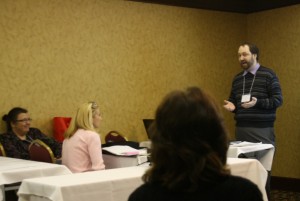Evaluation Packet: Part IV (Professional Development)
 Introduction
Introduction
Just before I began my career in the classroom, I became involved with an organization that required reflection as a means to better oneself. Inventories were taken to determine things I did well so that I could build on them. As part of those inventories, I was also able to determine those things I did not do so well so that I could work to improve in those areas. Eventually, a pattern of reflection became part of my routine and it has served me well throughout my career.
Since my last faculty evaluation, I have begun to follow the Buddha Dhamma in the Theravada tradition. “What,” some might ask, “does the Buddha Dhamma have to do with professional development?” On one level, a correct answer is, “Nothing.” Yet, to benefit from professional development, one must approach it with an attitude of mindfulness and reflection; a practice encouraged by the Buddha Dhamma.
As with anything else, professional development opportunities do not necessarily cause one to develop as a professional. Someone can sit through a presentation or even participate in an activity, list the opportunity in their faculty evaluation packet, and yet have no change in their behavior. Without reflection on what has been presented followed by a mindful approach to life, development does not happen. By being reflective and mindful, I can learn from both “good” and “bad” presentations.
I am not dependent on someone giving a quality presentation for me to learn. As I wrote in “Learning from Bad Books/Presentations”
When I was in graduate school, one of the books our professor assigned was not very good. To my surprise, he admitted that it was defective. “Why,” I thought, “would you teach a bad book?” What I learned was that sometimes we can learn from things that are not well done.
Furthermore, by being both reflective and mindful, I am able to encounter professional development opportunities on a daily basis. Some of the private journaling I have done throughout the years, blogging on Etena Sacca-vajjena, and my (almost) daily reflections on my Microblog encourage continuously reflection. Because I do not assign research topics in my classes, I am also constantly learning from my student’s research.
I believe that Professional Development is where you find it, in both formal and informal opportunities.
Scoring Rubric
For my formal evaluation, I can earn a maximum of 20 points for Professional Development. Instead of taking the time to list everything I have done during the past five years, I stopped listing items just after I had reached my maximum score. Therefore, the list I am submitting represents only a fraction of the professional development I have completed.
Professional Development on a Daily Basis
The best way to see how seriously I take professional development is to consult Etena Sacca-vajjena, my Mircroblog, and the evaluation blog where I took day to day notes I took on service and professional development during much of the fall 2011 semester.
–Steven L. Berg, PhD
LEAVE A COMMENT